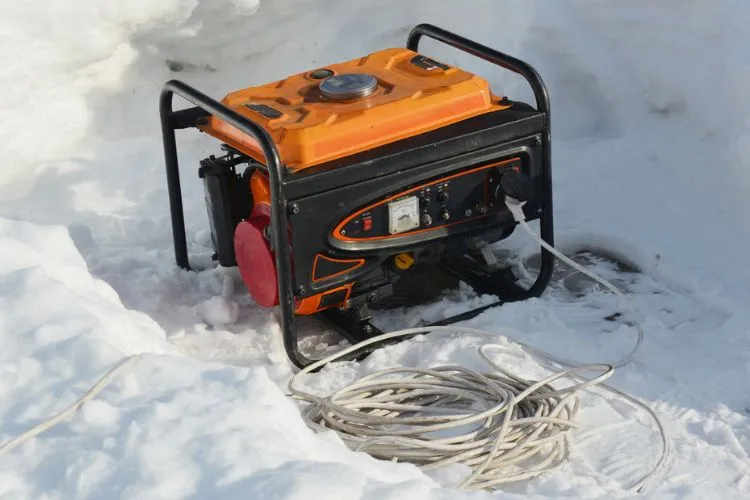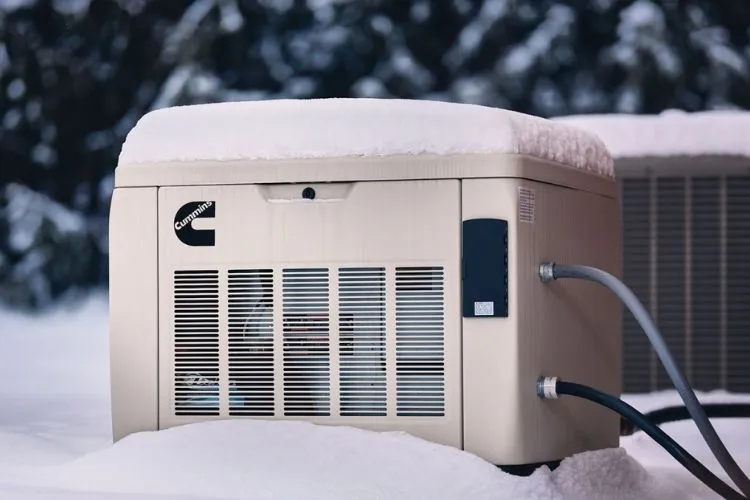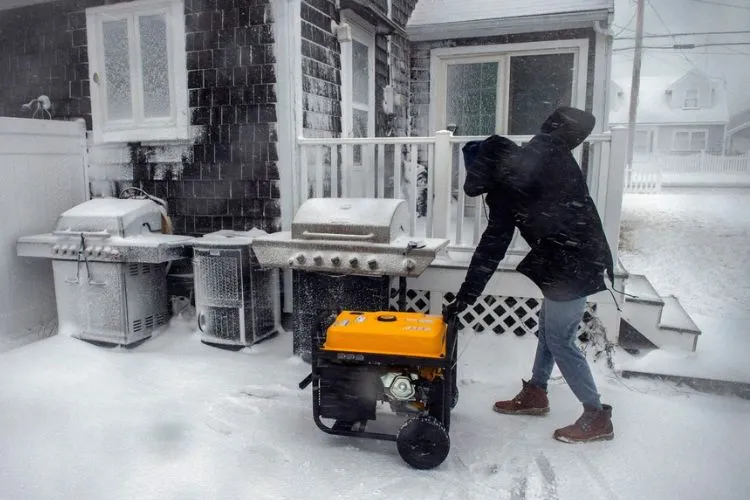As winter wraps its cold fingers around the land, portable generators become more than a convenience—they turn into a lifeline. But the harsh winter conditions pose unique challenges to keeping these essential machines running optimally.
So, how to keep portable generators running properly in winter? This guide presents a full breakdown of the steps and strategies to ensure your portable generator stands up to winter’s tests, keeping your power supply steady and reliable.

How To Keep Portable Generators Running Properly In Winter?
The transition into colder weather calls for specific adjustments to your portable generator. Fuel stabilization becomes paramount as temperatures drop. Adding anti-gel additives to your fuel can prevent it from thickening, ensuring smooth operation.
Similarly, switching to winter-grade fuel, specifically designed to perform in cold conditions, can make a significant difference.
Equally critical is the type of oil you use. Cold weather demands low-viscosity oils that flow more easily at low temperatures, ensuring your generator’s engine stays lubricated and runs smoothly. Manufacturer recommendations can guide the exact grade and type suitable for cold climates.
Cold Weather Kits and Their Advantages
Cold weather kits provide additional protection for your generator in freezing conditions. These kits typically include battery warmers, oil warmers, and engine block heaters—each designed to prevent the cold from impairing your generator’s performance.
Battery warmers keep the battery at a functional temperature, ensuring the generator starts when needed. Oil warmers maintain the oil’s viscosity, preventing it from thickening in the cold.
Engine block heaters warm the engine, making starting easier and reducing the wear from cold starts. Together, these tools can significantly enhance your generator’s reliability in winter.
Proper Storage Solutions
Where and how you store your generator can impact its winter performance. Ideally, keep it in a shed or garage, away from the harsh elements. This not only shields it from snow and rain but also makes starting it in freezing temperatures easier.

If outdoor storage is your only option, invest in a waterproof and insulated cover to protect the generator.
Keeping the generator in a dry, protected environment prevents moisture-related issues and ensures components like the fuel system and electrical parts remain operational.
Battery Maintenance for Optimal Performance
Battery maintenance is crucial, especially in winter when cold temperatures can reduce a battery’s charge. Keeping the battery charged extends its life and ensures your generator starts quickly when you need it.
A battery tender, a device that delivers a consistent, low charge, can be invaluable. It keeps the battery from losing charge over time without overcharging it.
You may also read: Diesel Generators Vs UPS Systems
Safe Operation in Winter Conditions
Running a generator in winter requires careful attention to safety, particularly regarding ventilation and protection from wet conditions. Ensure your generator operates in a well-ventilated area to prevent carbon monoxide buildup.
Additionally, keeping the generator dry and covered protects it from snow and rain, which could lead to electrical hazards. Adhering to these safety measures ensures your generator’s safe and effective operation through the winter months.
Routine Winter Maintenance Check-ups
Regular maintenance is key to a generator’s longevity and reliability, especially in winter. Inspecting and cleaning essential components such as the air filter, spark plugs, and fuel system can prevent common cold-related problems.

If you’re not comfortable performing these tasks, or if you notice issues during inspection, seeking professional maintenance services is a wise choice. They can address potential problems early, preventing more significant issues down the line.
Using Your Generator in Emergency Winter Weather
When severe winter weather strikes, knowing how to utilize your generator efficiently becomes crucial. Prioritizing power to essential appliances—such as heating systems, refrigerators, and lights—can help you weather the storm safely and comfortably.
Understanding your generator’s capacity and managing power allocation effectively ensures you make the most of your generator when you need it most.
Troubleshooting Common Winter Issues
In winter, users may face specific issues when operating portable generators. Here’s a brief guide to diagnosing and resolving some of these common problems:
- Difficulty in Starting: This often occurs from battery discharge or thick oil. You can address this by storing your battery in a warm place and using the right grade of oil for cold temperatures.
- Inconsistent Power Output: If your generator is delivering power inconsistently, check the fuel quality or the carburetor for blockages. Fresh, stabilized fuel and a clean carburetor are crucial for reliable power delivery.
- Fuel Line Freeze: Fuel lines can freeze in cold weather, blocking the fuel flow. Prevent this by storing your generator in a warmer area and using fuel line antifreeze products.
Ensure also to regularly perform preventive maintenance checks during the winter to minimize these issues.
Legal and Environmental Considerations
When using a portable generator during the winter, it is important to consider both legal and environmental factors:
- Local Noise Ordinances: Check with your municipality regarding noise restrictions. Generators can be loud, and during winter, sound travels further in the cold air, potentially disturbing neighbors.
- Emission Regulations: Be aware of state and local air quality regulations. Generators emit carbon monoxide and other pollutants, and certain areas may have regulations regarding generator use, particularly in residential areas.
- Safe Fuel Handling and Disposal: Properly store and dispose of fuels. Spills can be harmful to the environment, so use a fuel stabilizer and ensure all fuel is stored in approved containers. Dispose of old fuel according to local hazardous waste regulations to prevent soil and water pollution.
- Wildlife Considerations: In rural areas, your generator could affect local wildlife. Keep the generator secured and enclosed to minimize disturbance and prevent animals from coming into contact with hazardous substances.
Each of these factors ensures that you consider your community and environment while keeping your home powered and safe.
Frequently Asked Questions (fAQs)
Should I run my generator periodically in winter even when not in use?
Yes, running your generator periodically ensures it remains in operational condition, keeping components lubricated and identifying any issues in performance early.
Can I use standard oil in my generator in cold temperatures?
It’s advisable to switch to low-viscosity oils designed for cold weather to ensure the engine remains lubricated and starts easily in low temperatures.
How do I ensure my generator starts in freezing weather?
Using cold weather kits, including battery and oil warmers, and choosing the correct type of oil can greatly improve starting in cold conditions.
Winterizing Your Generator for Long-Term Storage
If you don’t plan to use your generator frequently during the winter, proper long-term storage is essential to ensure it’s in optimal condition when you need it. Before storing your portable generator for extended periods, follow these steps:
- Drain the Fuel Tank: Fuel left in the tank over time can degrade and cause starting issues or clog fuel lines. If you won’t be using the generator for an extended period, it’s a good idea to either drain the tank completely or run the generator until the fuel is exhausted.
- Clean and Inspect the Generator: Dust, dirt, and debris can accumulate on your generator, affecting its performance. Clean the unit thoroughly, paying attention to the air filter, cooling vents, and exhaust. Also, inspect for any signs of wear or damage that may require repair before storage.
- Check the Oil and Fluids: Make sure the oil is at the proper level and is clean. If it’s time for an oil change, perform that maintenance before storing the generator. Also, check other fluids such as coolant and ensure they are topped off.
- Cover the Generator: If you plan to store your generator outdoors, invest in a high-quality, weather-resistant cover. This protects the unit from snow, rain, and freezing temperatures. If you store it inside, ensure the area is dry and free from excessive humidity to prevent rusting.
The Importance of Regular Load Testing
Even if you don’t need to use your generator frequently, it’s important to test it under a load periodically. A load test involves running the generator with a moderate load for a set period to ensure it’s operating as expected.
This helps you spot potential issues before they become problems, ensuring your generator starts reliably when you need it.
A good rule of thumb is to perform a load test every 30 days during the winter months, especially if you’re not using the generator regularly.
Load testing ensures that the engine remains lubricated, and any blockages or issues with the fuel system can be addressed before an emergency arises.
Conclusion:
Maintaining your portable generator during the winter ensures it’s ready when you need it most. Adapting to the challenges cold weather presents requires a bit of preparation and regular maintenance.
By following the guidelines outlined above, you can ensure your generator runs smoothly throughout the coldest months, providing reliable power to your home or business in every frosty situation.
Remember, the well-being of your generator reflects the care you put into it. With the right approach, you can conquer the cold and keep the lights on, no matter what winter throws your way.
